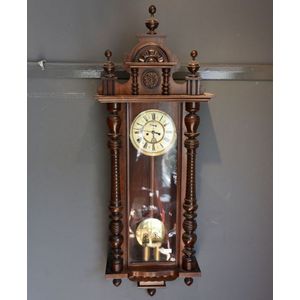Early 20th Century German Vienna Wall Clock
Wall clock by Gustave Becker early 20th century German walnut and beech Vienna wall clock. The Roman dial powered by an eight day weight driven movement with stained wood pendulum rod, striking on a gong, housed in case with turned finials to the pediment, over split turned columns and under square foot with finial. 135 x 44 x 17 cm
You must be a subscriber, and be logged in to view price and dealer details.
Subscribe Now to view actual auction price for this item
When you subscribe, you have the option of setting the currency in which to display prices to $Au, $US, $NZ or Stg.
This item has been sold, and the description, image and price are for reference purposes only.
- Finial - An architectural decoration, found on the upper parts of of an object. On furniture they are usually found on pediments, canopies and shelf supports. On smaller ceramic or silver items, such as spoons, they may decorate the top of the item itself, or the lid or cover where they provide a useful handle for removal.
Finials have a variety of shapes and forms. They may be urn-shaped, baluster shaped round or spiral, but usually taper into an upper point. Many real life shapes may also be used as finials, such as pineapples, berries, pinecones, buds, lotus and acorns. Sometimes animals such as a lion are depicted, or fish and dolphins. - Pendulum - The pendulum was discovered around 1602 by Galileo Galilei, and was adopted for time keeping by the Dutch mathematician and natural philosopher, Christiaan Huygens, who excelled in astronomy, physics, and horology.
The pendulum comprises a metal rod usually of brass or steel with a metal disk, known as a bob, at the end. The movement of the pendulum is driven by weights or a spring, and as a pendulum swings in a regular arc, it was found accuracy could be controlled to within a few seconds a week.
Timekeeping can be adjusted by changing the height of the bob on the rod, making the pendulum either swing slower or faster.
The disadvantage of the pendulum was that changes in temperature also changed the length of the pendulum, interfering with the accuracy of the clock, and so in the 18th century two types of mercurial pendulums were invented which countered the movement in the steel rod.
The pendulum was the world's most accurate timekeeping technology until the invention of the quartz clock, regulated by a quartz crystal, in 1927. - Movement - The technical name for the workings of a clock or watch, and does not include the dial or case.
This item has been included into following indexes:
